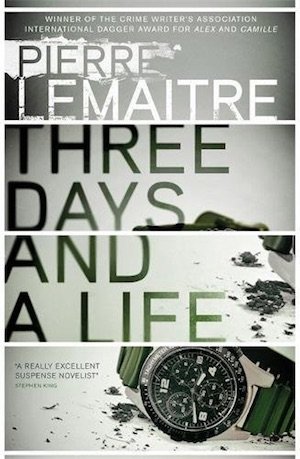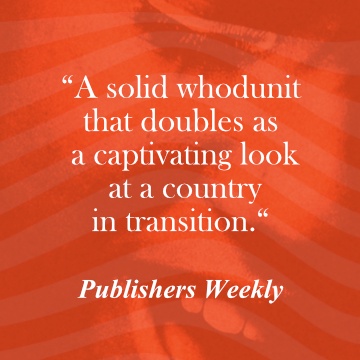Translated by Frank Wynne — You might remember Pierre Lemaitre as the author of the heart-pounding, unpredictable and rather graphic trilogy of crime novels Alex, Irene and Camille, winning the CWA International Dagger Award for two of them. Here at Crime Fiction Lover, we instantly adored his huge talent for storytelling and were among the first to interview him.
However, if you are expecting that same relentless pace and twisty tale in this latest novel, Three Days and a Life, you will be disappointed. That is not to say that this is not a good read, but it hasn’t quite got the wow factor of its predecessors. Instead, it is more of a gradual unfolding of atmosphere and characters caught in a claustrophobic situation. Particularly demanding thriller readers will find the middle part sags somewhat. The good news is that readers who were put off by the blood and gore of some of his earlier works will be relieved to hear this book is more about psychological rather than physical suffering. This is a thoughtful analysis of the long-term effects of a murder on an individual and on a community, more reminiscent of the style of Karin Fossum.
The story starts in 1999 in Beauval, a small French provincial town surrounded by forests. Antoine is 12 and living alone with his rather unhappy and lonely mother, who is obsessed with propriety and moral values. His father has started a new family abroad and is only present in his son’s life via expensive but inappropriate gifts. Then Antoine loses his friends to the new PlayStation obsession because his mother does not approve of video games, and unfortunately no-one is interested in the tree house he is trying to build in the woods. No-one except Ulysses, the neighbours’ dog, who even gives Antoine the idea of adding a dog-lift to the house. But then the dog is killed in a brutal act and a tragedy is set in motion, in which the neighbours’ six-year-old son also becomes an unfortunate victim.
It is very difficult to say any more without giving away the plot, so let us just say that the little boy’s disappearance and Antoine’s despair at the situation cast long shadows on everyone in the community. Years later, when Antoine has grown up and moved to Paris for his studies, he still cannot shake off the traumatic memory of those fateful three days around Christmas. His life has moved on, and he returns to Beauval very reluctantly for a 60th birthday party at his mother’s insistence. This return stirs up all the old memories and leads to more mistakes in the present.
This is the kind of book which you don’t read for the plot twists, although it does contain a few surprises, but savour for the accurate depiction of a community struggling with economic difficulties and unemployment. When grief strikes, the neighbourly feelings are shattered and class divisions become more apparent. The contrast between city life and the countryside is highlighted in the second part of the book.
Above all, the novel is a masterclass in character development. We share all the anxiety and moral dilemmas of the main character even if we have doubts about him. Lemaitre’s Goncourt Prize winning novel The Great Swindle about the aftermath of World War I should have prepared us for this moral ambiguity. Lemaitre is extremely clever at creating protagonists that reveal serious human flaws, while simultaneously arousing our sympathy and making us question our own moral certainties.
MacLehose Press
Print/Kindle/iBook
£7.49
CFL Rating: 4 Stars












